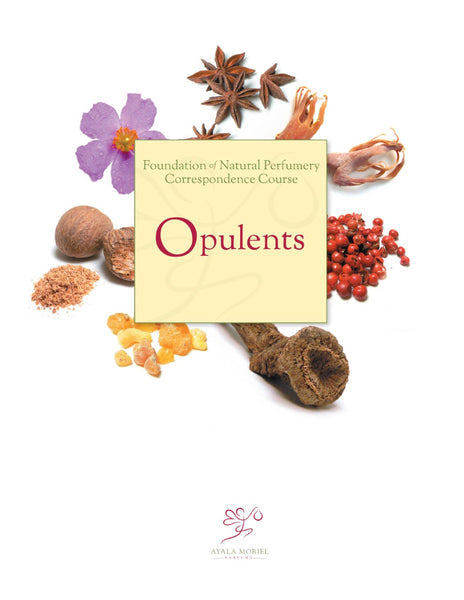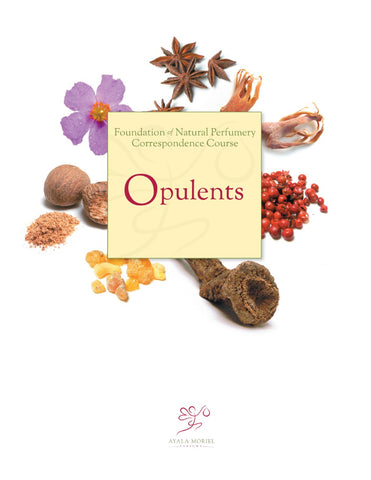Courses
-

Ayala Moriel Parfums
Art of Perfumery Masterclass #4: Opulent Perfumery
$1,800.00
Visit product page →Masterclass with world-renown Master Perfumer Ayala Moriel, at her state-of-the art perfume studio, lab and fragrant garden located at the foothills of breathtaking village of Clil, overseeing the Mediterranean. A rare opportunity to learn from a master and world-leader of modern Natural Perfumery and truly immerse yourself in the perfume plants both wild and cultivated, and explore the region where perfume and incense originate.
Designed for students who want to excel in their studies of natural perfumery. This week-long intensive Masterclass runs Sun-Thu from 8:30am-3:30pm, and offers theoretical and practical guidance alongside hands-on lab exercises and experiments.
This session covers studying the raw materials, perfume structure, how to blend a formula, how to write a formula, building accords and creating simple solid perfumes, and basic Oriental formulation in an alcohol base. Featured workshops: Incense Making Workshop (Indian-style incense cones or Ancient Egyptian Kyphi).Course Schedule and Structure:The course runs a full week - Sunday through Thursday from 8:30am to 3:30pm.The mornings (8:30am-12pm) are dedicated to theory and studying olfaction (discerning between notes). The afternoons (1pm-3:30pm) are a lab session which is dedicated to the practical implementations of what was studied in the morning, i.e. weighing, measuring, recording, formulation, composition and compounding.The fee includes all materials and supplies used during the course, as well as a homemade vegetarian/vegan lunch, and fragrant refreshments served daily.Students are required to purchase a course textbook, and are also encouraged to procure their own Basic Essences Kit prior to their first course start date. The same book is used throughout the entire program. It is recommended that you complete the Fragrant Note Study Guide with all your essences from the Basic Essences Kit prior to attending this course.The fee includes all materials and supplies used during the course. Students are required to purchase a course textbook prior to their first course start date. The same book is used throughout the entire program.Prerequisites: Must have completed the Citrus & Colognes Week and/or Lab 101, Chypre and/or Fougère courses.Dates: November 10-14, 2019Location:The course takes place at Ayala Moriel's new studio in Clil, Israel. This little off-the-grid organic village has scenic is in one of the country's most fascinating regions, the Western Galilee - and has a view of the Mediterranean sea (gorgeous beaches are only 20min drive), Haifa Bay and Mount Carmel. Clil provides a unique experience for students who choose to stay here (although you don't have to - there are also plenty of places around, but keep in mind that in that case car is a must). The village is solar-powered and has small population of under 1000 people, who live in custom-built homes and semi-temporary dwellings (yurts, teepees, modified train cars and shipping containers, etc.) that are scattered among ancient olive groves and wild bush and Mediterranean garrigue (comprising of carobs, oaks, pistachia and thorny bushes). Despite its size, the village is a community bustling with life and culture: our neighbours are the village's cafe (inside a tent) that is opened Thursday-Saturday and hosts live concerts, and there.Amenities:There is a bakery that is opened twice a week (Sunday and Thursday) and offers Pizza Nights on Tuesdays. On all other days bread can be pre-ordered or purchased at the local Organic Garden (which tops off their own produce with other fruit and vegetables and organic goodies produced in the village and by nearby artisans). Thursday evenings there is a little market in the village's playground, weather permitting. Also less relevant but sometimes handy are the village's book exchange and clothing exchange, which is open 24/7 and is completely free (take what you want and leave what you no longer use).Accommodations within the village include one boutique hotel, one guest house (India-style "hostel" on the second level of one of our neighbours) and several cabins for rent - some also offering breakfast. Sublets among the village's inhabitants are often listed and could be arranged if booked enough in advance, and also near Cafe Clil there is a small campsite for those who enjoy a fully rustic experience.Dates: Dates: 10-14.11.2019(Previous time this course was offered: April 23-27, 2017)Correspondence Course Option:
Study at your own pace and space with this unique program tailored to self-study, that will guide you through the course's textbook, "Foundation of Natural Perfumery" (purchase the book separately). This program is more flexible, as it allows you to choose which modules to study in person at the studio, and which ones to study remotely, on your own.It is important that you take the modules in the order that they are offered, as follows:
- Citrus & Colognes + Lab 101
- Foug ère
- Chypre
- Opulent Perfumes
- Florientals
- Floral Bouquets
- Soliflores
- Leather & Tobacco
- Marine & Aquatic
You can register for the correspondence courses anytime, and complete the entire 8-module program at your own pace. Studying will progress according to the self-study guide that will be sent to you upon registration, which will include:
- List of raw materials that are key components for this particular genre (AKA Fragrance Family)
- List of tools and equipment you will need for this module
- List of the exercises in the book, and in which order to perform them
- Additional reading materials and links to relevant suppliers
- Additional creative thinking and exercises that are not in the book, and usually take place at the week-long sessions at the studio.
- Online support via email or Skype chat - offered up to 6 months from date course was purchased.
- Future component of the correspondence program (still in the making): Access to online video tutorials
- Receive personal, in-depth, insightful feedback for 4 Opulent perfumes you've created as the practical assignments in this course
We recommend that you also purchase the essences kit we've designed for this module, which are the raw materials unique to each module, and which are important for completing the practical components of the course.


